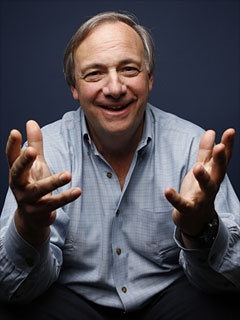
Ray Dalio runs the largest hedge fund in the world. His personal net worth is $17 billion. Along with Bill Gates and Warren Buffett, he pledged to give half of his money to charitable causes. At the same time, his coverage in the press gives the impression of a crazy big-brother approach to decision making at work, where every word and action is video recorded, documented and analyzed.
Dalio recently spoke at the New York Times “New Work Summit” in Half Moon Bay, just two days after a Times article detailing turmoil at his hedge fund. The night before the main event, I ran into noted journalist Charles Duhigg over drinks. He was on the hook to interview Dalio live on stage the next day, presumably a tough job given the blood in the water.
Duhigg’s pithy prediction, “Well, I expect him to be direct.”
Dalio was direct, but not the way I expected. He was wise and even-keeled. The interview was well done and the recording is worth watching. My take away:
Radical Truth And Transparency
Duhigg opened by asking why he runs his company the way he does. Here is what Dalio said, edited for brevity:
I want an idea meritocracy. I want independent thinkers who are going to disagree. The most important things I want are meaningful work and meaningful relationships. And I believe that the way to get those is through radical truth and radical transparency.
Meaningful work is being on a mission that you're excited about and that you can get your head into. And in meaningful relationships you can be totally transparent with each other, letting each other know what your weaknesses are.
Wouldn't you rather have an idea meritocracy than the emotional barriers that a lot of people have? Your logical self wants it, and your emotional self doesn’t. And through exercise, through practice, you can bring those things into alignment. And then you can get truth.
At this point I was leaning forward, listening to the sound of one man tapping into a very rational sort of mindfulness, a surprising view that extended beyond the world of a billionaire hedge fund manager into the daily work of managers and leaders in any business.
The Power of Diverse Teams
When he extended his thoughts to speak about the value of teams in decision making, I practically jumped out of my seat:
You start to learn how people see things differently. And rather than just seeing how you see it, you go above that. You're seeing that everybody is seeing things differently.
It changes how you see things because it starts to make you think, how do I know I'm not the wrong one? You start to think, how do I collectively see? And it's like being in a different color range. All of the sudden you see the full spectrum.
When you start to realize that people are actually seeing in those [different] ways -- that it’s a valid way of seeing, and that I need you and you need me -- it gives you the evidence base that it's okay to be different.
Yes! Individuals who take on other perspectives make better decisions. Teams of such people make even better decisions. And diverse teams make the best decisions of all.
Cloverpop decision process analytics give statistical proof of Dalio’s point. When it comes to his approach to business decisions, there is a measly 0.03% chance that Dalio is wrong.
A Challenging View Of The Future Of Decision Making
As befits a deep-thinking and blunt conversation, Dalio’s prophetic view of the future challenges us to take a stand:
Radical transparency is coming at you. You can't avoid it. Right here today, it's easy to find out, from publicly available data and other data, what you are doing. And what you are like. So we're going to move forward into an era of more radical transparency. Knowing how to manage that is something of tremendous benefit.
The most important thing is to have humility, and to think about, how do I get the best decision? It doesn't have to come from me. I just want it to be right, right? If comes from other people, that’s good.
I think he is right. A radically more transparent and truthful way of managing and making business decisions is coming. And it will take a different approach to management and leadership.
Better, Faster, Meaningful vs. The Greatest Tragedy
Some version of radical truth and transparency will become the dominant way of managing companies in part because technology makes it easy, but most of all because it unlocks the value of different perspectives, increases trust and commitment across an organization, and results in provably better and faster decision making.
What if, like Ray Dalio, you could see the who, what, when and why of business decisions being made across your company? What if you could track which managers best empower their teams and leverage the power of diversity? What if you could measure how well, and how fast, your organization is responding to new information and solving emerging problems?
Dalio says that way of working lets you act and react better than your competition, innovate faster and close more deals, all while creating more meaningful work and meaningful relationships. And if that’s not enough motivation to change, his thoughts on the current situation are equally clear:
The greatest tragedy of mankind is people holding on to wrong opinions that could so easily be rectified and that are doing them harm because they're making wrong decisions.
I think transparently measuring, managing and improving the process of making decisions will define the future war for talent and the basis of business competition. What do you think?

